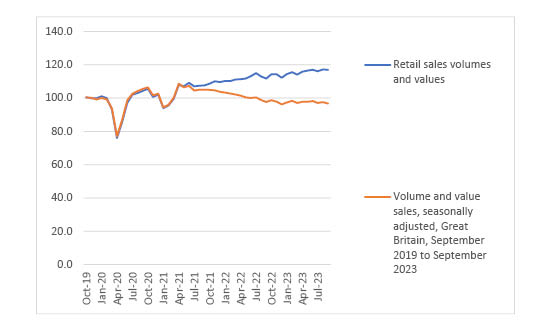


Over the years investors have heard many justifications from companies seeking to excuse an earnings miss, but one of the most persistent is that the weather, be it good or bad, was responsible.
This earnings season has been notable for the number of different companies citing weather issues as the reason for sales disappointment – and when you consider the torrential downpours in July, and September’s unseasonable heatwave, it’s not hard to understand where they are coming from.
A cold pint of Heineken or an Aperol spritz goes down great at barbecues and outdoor parties when the sun is shining, but July’s cold and rainy weather rather put a dampener on things and both companies highlighted the weather as a factor in falling or slowing sales growth.
“…volatility in sales performance is a result of changing weather conditions rather than any underlying changes in the consumer economy.”
The beer maker reported a 7.6% fall in sales across Europe with the company’s chief executive Dolf van den Brink blaming “the impact of adverse weather” for at least some of the downturn.
Aperol maker Campari did better than many other spirit makers but sales growth of 4.4% over the last quarter was behind expectations, with sales in its home market particularly impacted by both extremely hot temperatures and flooding.
It’s not just alcohol consumption that’s been impacted: frost, heavy rainfall and drought have combined to cause global wine production to drop to a 62-year low.
Yields were down in almost every EU country, except France which has once again grabbed the global wine production top spot, and the US has also seen production levels soar, which will offset declines elsewhere in the world. Coupled with falling demand that should keep prices stable.
The volatile weather also played havoc with clothing sales with H&M one of the first retailers to shout foul.
Back in June the fashion chain warned that sales had been weighed down by a chilly European spring but by the autumn a snap of hot weather put shoppers off its Autumn/Winter clothes.
With London clocking in at a balmy 33 degrees at the beginning of September shoppers shunned winter woollens that had just taken centre stage in stores.
Next, which has been one of this year’s bright stars, remarked in its last trading update that the “volatility in sales performance is a result of changing weather conditions rather than any underlying changes in the consumer economy”.
“The weather as a handy excuse must be treated with a degree of scepticism but looking back over the past year you can’t help but factor in those extremes when it comes to retail sales.”
Similarly, Marks & Spencer, which has finally found its fashion mojo, warned that the outlook for 2024 “remains uncertain” with “erratic weather” one of the four reasons singled out.
Clearly there’s far more at play and M&S highlighted three other major issues facing all companies as we head into the new year – “the probable impact on the consumer of the highest interest rates in 20 years, deflation [and] geopolitical events” and with Heineken reporting price rises of more than 7% over the year, that’s something that must be factored into sales.
And though ASOS can be lumped into the same boat with the other three fashion brands previously mentioned, the poor weather only compounded existing company woes.
The weather as a handy excuse must be treated with a degree of scepticism but looking back over the past year you can’t help but factor in those extremes when it comes to retail sales.
UK retail sales values and volumes

Source: ONS
For years supermarkets have utilised weather forecasts to help them stock the shelves with the kinds of good people want to buy.
As a news reporter I spent quite a bit of time talking to the man in charge of making sure Morrisons was ordering the right products for the weeks ahead, poring over forecasts to ensure the customer could find exactly what they wanted when they decided they wanted it.
Unlike winter coats, beef burgers can’t just be pushed back into the depths of the warehouse for another day and burgers are exactly what was called for at the beginning of September when the sunshine tempted people to uncover their barbecues for one last, unexpected time.
The big question for supermarkets is whether that unexpected shift in habits will have consequences.
September is traditionally the time consumers start stocking up on those festive goodies, things like puddings and biscuits, but according to data released by Kantar, that didn’t happen this year as people chose to spend their cash on ice cream and dips instead.
With the British Retail Consortium already warning that Christmas sales across the board could be impacted by budget constraints the impact of that change to the normal order could result in people skipping those purchases altogether – which could force some retailers to take out the red pen to shift unwanted goods at seriously marked down prices.
Like ripples from a stone dropped into a pond the impact of unseasonable weather has far-reaching consequences, consequences that can’t always be mitigated even by the most thorough planning.
Past performance is not a guide to future performance and some investments need to be held for the long term.
This area of the website is intended for financial advisers and other financial professionals only. If you are a customer of AJ Bell Investcentre, please click ‘Go to the customer area’ below.
We will remember your preference, so you should only be asked to select the appropriate website once per device.